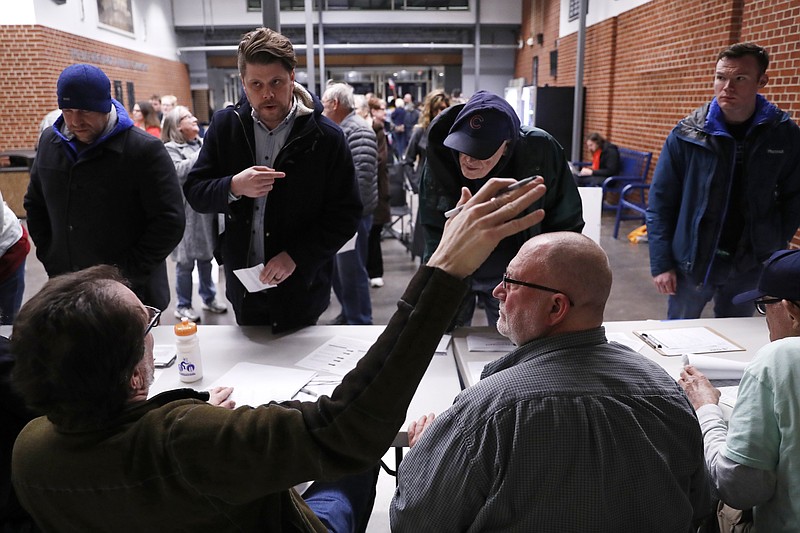Imagine yourself Bernie Sanders or Elizabeth Warren or Joe Biden or Pete Buttigieg or Amy Klobuchar on Tuesday morning. You and your Democratic supporters have spent millions of dollars, and you have put in hours in Iowa when you could have been running your city, forging bipartisanship in the Senate or enjoying retirement.
You have had to shake thousands of hands, coo at drooling children and eat more breaded pork tenderloin, poutine and German potato soup than you'd care to remember. Now you're standing in frigid New Hampshire with nothing to show for it.
Monday night was the moment when you were to have stood on a Des Moines stage and declared you were now the party's front-runner for the White House, or your second-place finish was better than you could have ever imagined, or that your 5% of the vote clearly said your campaign now had momentum for the long haul.
Gone. Vanished. Poof.
Democrats throughout Tuesday were furious that a reporting app that was supposed to count votes let them down. It did not function properly and did not give them the parsed data they so wanted to have so candidates would know not only who triumphed in the state's complicated caucus system but also who got the most raw votes. In fact, having quickly jetted to the Granite State for its primary a week away, the candidates knew almost nothing about what happened in the state where they'd spent much of the last year.
(MORE: Tech problem with mobile app causes Iowa caucus chaos)
"[W]e determined with certainty that the underlying data collected via the app was sound," the state's Democratic Party chairman helpfully reported at midday Tuesday.
But other than that, Mrs. Lincoln, one might have asked, how was the play?
It all was mindful of the 2013 rollout of the Obamacare website, which continued crashing for more than a month after it was to go online. Blame was spread far and wide. And it was only the beginning of the partisan health care law's still troubled existence.
Two things, among many others, are bound to result because of the Iowa snafu.
The first is that the Hawkeye State either will no longer host the first-in-the-nation presidential voting event or it will be changed into a traditional primary.
The second is that President Donald Trump will rightly point at the mess that was the caucus and ask if Democrats can't get their caucus right, how can they be trusted to do what the candidates promised in Iowa - run health care for the country, deliver free education, open the borders to all comers, offer jobs for all and create slave reparations?
Critics, as they were doing before the caucus ever got underway, will ask how Iowa is a good starting place for a campaign whose winner seeks to be the president of a diverse, divided, partisan country? After all, Iowa is 90.3% white 3.51% black, 36% rural and has almost seven times as many hogs as people.
But what would the perfect state be, the most representative of the average of the entire country? NPR actually looked at that potentiality four years ago and declared Illinois would be the best choice. It comes closest to the entire country in racial makeup, share of citizens with a bachelor's degree, median age, median household income and share of the population who call religion "very important."
(MORE: Buttigieg slightly leading Sanders in partial Iowa caucus results)
Illinois is interesting in that the state has had Republican governors for 33 of the last 50 years but voted for the Democratic presidential candidate in the last seven presidential elections. And if you looked at a map of the counties that voted either red (Trump) or blue (Clinton) in 2016, most of the state is either red or pink. But those few blue counties around populous Chicago made the difference for the Democrats and Clinton.
But we digress.
Back to 2020, it was odd and a little sad to see the candidates each take to their individual stages Monday night and proclaim ... well, that they somehow, sort of won the day and that the fight goes on. As they did that, left-wing news and blog sites were trying to figure out how Trump, Russia, Mitch McConnell or Lamar Alexander were responsible for the app glitch.
And it was eerily spooky that the day the Iowa caucus died (or should) was Feb. 3, also the Day the Music Died. Sixty-one years ago, on Feb. 3, 1959, a plane carrying singers Buddy Holly, Ritchie Valens and "The Big Bopper" (J.P. Richardson), and pilot Roger Peterson, crashed shortly after take-off near Clear Lake, Iowa. Long before apps could be blamed, the investigation into the crash indicated the pilot was at fault for "embark[ing] on a flight" that required instrument flying skills he did not have.
